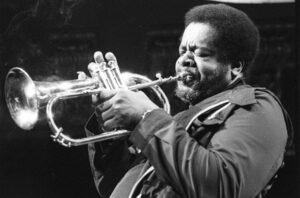
Display caption
Image: Dr. Donald T. Byrd. Credit: Courtesy of the artist.
Dr. Byrd has been one of the most influential figures in jazz for the past four decades. From the start of his career, Dr. Byrd was closely associated with many of the giants of jazz, including Charlie Parker, Thelonious Monk, Max Roach, Sonny Rollins and John Coltrane, with whom he recorded fourteen albums.
Making a powerful initial impact on the New York jazz scene in the early 1950’s with such groups as Art Blakey and the Jazz Messengers, Donald Byrd quickly became one of the most sought after musicians of what has come to be known as the “hard-bop” era – an era this trumpeter helped to define. Known for his passionate ballad playing, as well as for his driving, yet soulful solos and lightning-speed tempos, Dr. Byrd also gained an outstanding reputation as a composer, arranger and bandleader at a very young age.
During the 1960s, Donald Byrd became one of the leading innovators in jazz by incorporating vocal arrangements into his music and by developing a sound that was uniquely his own. While he wrote scores for orchestras and movies throughout Europe, Dr. Byrd also studied with the famed composer and theorist Nadia Boulanger. His studies and associations with musicians and composers of such high caliber allowed him to methodically develop his own theoretical system of harmony and melody. In the process, he introduced such important figures as Duke Pearson and Herbie Hancock-who later flourished as one of the most prominent pianist-composers in jazz-to “jazz fusion,” which is the combined elements of jazz, funk and rhythm-and-blues. Donald Byrd then continued to break new ground in the early 1970s when he himself became one of the leading proponents of “jazz fusion.” Working with a group of students from Howard University, he established the Blackbyrds, a group that not only went to the top of the charts among contemporary bands, but which also managed to earn three gold records and three Grammy Award nominations.
Forever an innovator, Dr. Byrd created the “Blackbyrd Special,” his own custom-designed trumpet, which also made him the first musician to design and market his own horn.
During the 1980s and 1990s, Donald Byrd continued to shine with his creative musical brilliance. Always one who has managed to remain on the cutting edge of music, Dr. Byrd recently collaborated with the hip-hop artist GURU on his album entitled Jazzmatazz, Volumes I and 2. After three tours with GURU around the United States and Europe, Dr. Byrd continues his contribution to the continuum of bebop to hip-hop, and has been labeled one of the most sampled jazz artists in rap, worldwide.
In addition to Donald Byrd’s contributions to jazz performance, he has also made outstanding contributions to jazz education. He has managed to intertwine education and his art form to keep the jazz tradition alive and well. He holds several Masters degrees (one from The Manhattan School of Music and two from Columbia University), an earned Doctorate in Music Education from Columbia University, and he is a published scholar. Dr. Byrd’s career as an educator dates back to the 1950s when he collaborated with Billy Taylor in teaching jazz in the New York City public schools. In 1959, Dr. Byrd was responsible for racially integrating the Stan Kenton jazz teaching clinics – clinics which eventually led to the incorporation of the National Association of Jazz Educators, now known as The International Association of Jazz Educators.
Since the 1950s, Dr. Byrd has been one of the pioneers who has sought to establish “the art of teaching jazz ” and has been instrumental in creating and furthering university-level jazz programs. The creation of jazz programs was not an easy feat considering that jazz education had not always been accepted in universities as a teachable art form. Included in the list of jazz education programs which Dr. Byrd either founded or in which he played an integral part in their creation, are the African-American music and jazz studies programs at Rutgers University, Howard University, North Carolina Central University, the Oberlin Conservatory of Music and, most recently, Queens College. His continuous dedication to education and young people are also exemplified by his present endeavors as a “Distinguished Scholar” at Delaware State University, where he gives lectures for various classes in music, the business of music, and African-American history; provides advanced-level instruction on the trumpet; and makes presentations at faculty roundtables about jazz history and the impact that jazz has made in the world of music. He also contributes to the education of young people in the field of music by his weekly presentations, classes and lectures with Jazzmobile around the city of New York, and the recent development of a teaching method, “Math is Music and Music is Math,” geared for grades six through nine, that explores the relationship of math to music – utilizing music to understand math. The program was implemented in the Detroit Public School System beginning in November 1998, with other school districts to follow in the near future.
Dr. Donald T. Byrd (1932-2013)
*Bio from Award presentation.